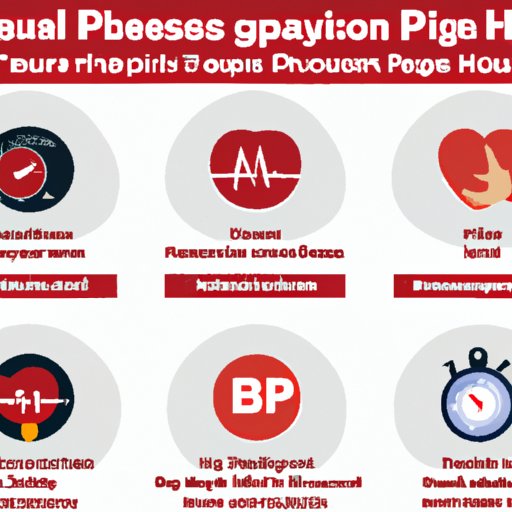
Introduction
High blood pressure, or hypertension, is a common medical condition affecting millions of people worldwide. It occurs when the force of blood against the walls of blood vessels is consistently too high and can cause long-term health issues if left untreated. This article highlights the seven warning symptoms of high blood pressure, helps you understand the causes and effects of high blood pressure, and provides information on how to measure and manage high blood pressure effectively.
Warning Signs: 7 Symptoms to Watch Out For
High blood pressure is often called the “silent killer,” as it may not have any noticeable symptoms for extended periods. However, some warning signs that may indicate hypertension, include:
- Headaches: persistent headaches, especially in the back of your head and neck area, may signal high blood pressure.
- Dizziness and lightheadedness: feeling dizzy or faint upon standing up may be a symptom of hypertension.
- Shortness of breath: difficulty breathing, even during minor physical activity or at rest, can indicate high blood pressure.
- Chest pain: tightness or chest pain alongside other hypertension symptoms should not be ignored.
- Fatigue: feeling consistently tired or lethargic can be a sign of high blood pressure.
- Vision problems: blurred vision or changes in eyesight can also be a warning sign of hypertension.
- Irregular heartbeat: an irregular heartbeat, or palpitations, can occur due to high blood pressure or an underlying heart condition.
Understanding High Blood Pressure
High blood pressure is when the force of blood on the walls of your arteries is consistently too high. When left untreated, it can cause damage to your organs and lead to serious health problems such as heart attack, stroke, or kidney failure. High blood pressure can be linked to multiple factors, including:
- Genetics: family history plays a significant role in hypertension.
- Lifestyle: unhealthy eating habits, lack of exercise, and high stress levels can cause high blood pressure.
- Age: blood vessels tend to become less flexible over time, resulting in higher blood pressure.
- Medical conditions: chronic kidney disease, diabetes, and sleep apnea can also cause hypertension.
When your blood pressure is too high, it can damage the heart, kidneys, brain, eyes, and blood vessels. It can result in a stroke, heart attack, aneurysm, or heart failure.
Is Your Blood Pressure Normal?
Measuring your blood pressure is essential to detect hypertension early. Blood pressure is measured using two numbers. The upper number is the systolic blood pressure, indicating the pressure when your heart beats. The lower number is the diastolic blood pressure, indicating the pressure when your heart is resting between beats. Normal blood pressure readings should be around 120/80 mmHg. High blood pressure is considered a reading of 140/90 mmHg or higher, and it is crucial to manage that.
You can measure your blood pressure at home using a blood pressure monitor or by visiting a healthcare professional.
The Silent Killer
High blood pressure can be a silent killer as most people do not realize they have it until damage has already occurred to their organs. Not recognizing the warning signs of hypertension can have severe consequences such as:
- Heart disease: damage to arteries and high blood pressure can cause a heart attack, angina, or heart failure.
- Stroke: high blood pressure increases the risk of a stroke by damaging blood vessels in the brain or leading to blood clots.
- Kidney failure: hypertension can cause damage to the kidney’s blood vessels, affecting its optimal functioning.
As a result, it is crucial to take the symptoms of high blood pressure seriously and seek medical help if necessary.
Don’t Ignore the Signs
Those with high blood pressure can take steps to reduce it and prevent damage to their organs. Lifestyle changes such as losing excess weight, regular exercise, stress management and a healthy diet can significantly lower blood pressure. It is also essential to take medication and closely monitor your blood pressure if the doctor prescribes it. Additionally, make sure to schedule regular check-ups with your healthcare provider to stay on top of managing your blood pressure.
If you experience any symptoms of hypertension, it is essential to make an appointment with a healthcare professional to get an accurate and timely diagnosis. Symptoms may indicate high blood pressure but could also be associated with other underlying conditions. Never ignore warning signs as early detection of hypertension can make a difference in your long-term health.
Conclusion
High blood pressure is a common condition that can often go unnoticed until it causes life-altering consequences. Early detection of warning signs is crucial in managing hypertension and preventing serious health problems. Making lifestyle changes, seeking medical help, and regular check-ups can help keep blood pressure under control and reduce the risk of organ damage. Don’t ignore the warning signs, take control of your health, and seek medical help if necessary.





